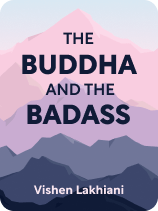

This article is an excerpt from the Shortform book guide to "The Buddha and the Badass" by Vishen Lakhiani. Shortform has the world's best summaries and analyses of books you should be reading.
Like this article? Sign up for a free trial here.
Are you struggling to find your true identity? How can you become enlightened?
According to Vishen Lakhiani’s book The Buddha and the Badass, there are two parts to becoming spiritually enlightened. The first part is getting to know yourself well, and the second part is creating a routine that lets you continuously grow spiritually.
Let’s look at how to become enlightened with these tips.
1. Find Your Inner Identity: Your Values and Purpose
If you want to know how to become enlightened, the first step is understanding your unique inner identity—what Lakhiani calls your soulprint (like a fingerprint but for your self). Your inner identity is made up of your values and your true purpose, writes Lakhiani. When you understand those aspects of yourself, you can live every day in alignment with them, which will give you the inner peace and contentment of enlightenment.
Values
Lakhiani writes that values are the beliefs you have that inform how you think and act, and these values are often shaped by big life experiences. The values you derive from your experiences are unique to you, and when you understand them, you can live by them.
He notes that challenging life experiences tend to shape your values more than pleasant or happy ones. For instance, you might be more affected by losing an important contest you’ve worked hard for than if you won that contest, and the experience might be more likely to lead you to develop values that shape your thinking thereafter.
Lakhiani stresses that we often let ourselves be influenced by societal values because we believe doing so makes us more significant in the eyes of others. If you feel others will be more impressed if you attain wealth and prestige than if you spend your time making experimental art, you may end up valuing wealth over creativity.
However, he advises that you don’t let the values of others become your values, as doing so will lead you down an unfulfilling and miserable path away from enlightenment. Stick to your own values instead. When you stop letting the opinions of others affect you and you see yourself as good enough as you are, you’ll have greater ease and more happiness in life.
How to Determine Your Values
Lakhiani offers a way to determine what your true values to become enlightened:
- Pinpoint some terrible and some great moments in your life. Reflect on what you learned from those moments.
- Note as many values as you can that emerged from those moments.
- Group similar values together to create four categories.
- Determine what unites the values in those categories, and give those categories corresponding names.
- Once you’ve determined those four values, flesh out a short description of how those values inform your work and life.
Purpose
Your values inform your life’s purpose—what the Universe wants you to do. Lakhiani advises that you stay aligned with that purpose and let it inform everything you do, and this will lead to spiritual fulfillment.
He writes that your purpose often manifests as an intuition—an inner voice that nudges you in a certain direction—when you live according to your values. For example, based on your value of harmony and your love of science (which forms part of your inner identity), you might intuit your purpose is to use psychological research to help people be in greater harmony with each other. If you steadfastly follow this purpose, you’ll feel content in life.
(Shortform note: Lakhiani’s instructions on how to find your purpose are somewhat underdeveloped—he says you might intuit your purpose but doesn’t provide concrete actionables for how to find your purpose if your intuition fails you. Fortunately, other authors, like Simon Sinek, have written extensively about how to find your purpose. He advises you to compose a personal purpose statement, in which you articulate what impact you want to have on the world and the actions you’ll take to do that.)
2. Create a Morning Routine to Foster Spiritual Enlightenment
In addition to understanding yourself better to become enlightened, Lakhiani also recommends a specific morning routine that will support your constant growth and journey toward spiritual enlightenment. This routine takes up a considerable amount of time, but Lakhiani emphasizes that you save much more time over the course of your day and life by investing in your wellness every day.
This routine begins with getting high-quality sleep. You can do this by using supplements, sleep trackers, and by meditating before bed. If you can improve the quality of your sleep, you’ll have to sleep less, which gives you more time for other pursuits during the day. Once you’ve woken up, perform a six-step meditation in which you practice compassion, gratitude, and forgiveness, and envision your future life and your ideal day. End with a blessing to yourself (you can find this meditation on YouTube). After this, exercise. Next, eat a healthy breakfast, and finally, read an educational book to enhance your knowledge.

———End of Preview———
Like what you just read? Read the rest of the world's best book summary and analysis of Vishen Lakhiani's "The Buddha and the Badass" at Shortform.
Here's what you'll find in our full The Buddha and the Badass summary:
- Why you don't need to work long, grueling hours to be successful
- How to transform your workplace from mundane to fun
- How to merge spiritual enlightenment with disruption






